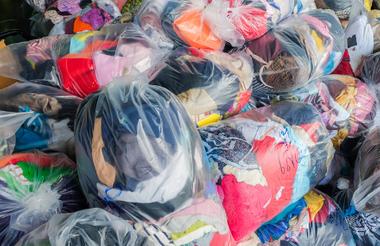Charity retailers are facing “a period of unprecedented turmoil” in the market for clothes their shops cannot sell, a sector expert has warned.
In a recent update, Charity Retail Association (CRA) chief executive Robin Osterley discussed the problems associated with the collection of clothing from charity shops – known as rag – which is sold by the kilo to textile recyclers.
Osterley said the price of rag has declined from “some very high levels” in the early 2010s to around 45p per kilo in 2015 and around 35p last year.
He said CRA’s latest quarterly market analysis shows that its members receive on average no more than 1.9% of their income from the sale of rag, which “is in contrast to the amount of energy that often is expended in having discussions with collectors to increase the price”.
‘Perfect storm’
Osterley said that rag collectors were facing “a perfect storm” at the moment.
This is due to geopolitical issues such as wars and global transportation difficulties, labour market challenges associated with Brexit and a shift to sorting more items overseas.
He also said a drop in the quality of second-hand clothing that reaches collectors was a factor, partly due to lower-quality items being donated to shops.
These issues could lead some collecting companies to be driven out of business, which could have “a devastating impact” on charity retailers.
“An increase in costs (including in the price paid to charity shops) and a decrease in available income for collectors is inevitably going to have a knock-on effect on our sector,” Osterley wrote.
“We’re already seeing a decline in service levels from some merchants; and worse still an increase in non-payment for collected goods.
“Whilst I’m in no way wishing to minimise the importance of raising as much money as possible for charities – that is after all what we’re here for – in many ways the income we get from rag is less important than having the facility to have our excess clothing taken away.
“If we had to send it to waste instead the consequences would be very severe: not only would it increase our costs dramatically, but it would also compromise our position of being the UK’s leading facilitator of reuse.
“Further, it’s not difficult to imagine what the public response would be if they became aware that a high proportion of what they’re donating to charity shops ends up in landfill or incineration; not only would they probably stop donating, but our reputation would take an enormous hit.”
Collapse of collecting industry would be ‘worst thing for charity sector’
Speaking to Civil Society, Osterley said this is an issue affecting everyone, “as the UK textile recycling industry plays a hugely important role in diverting textile waste from landfill, protecting our environment, as well as providing jobs”.
“It’s imperative that the industry is supported to continue doing its vital role,” he said.
“The charity retail sector is well aware of the importance of the textile recycling industry and there are many steps being taken within the industry to improve and support it, such as the TRUST licensing system, which ensures that collectors and traders adhere to proper health and safety and human resource standards, are as environmentally sustainable as possible and are practitioners of sound business.
“Many charity retailers have now committed to only working with TRUST-approved traders.”
Osterley advised charities to establish partnerships with collectors rather than doing “straightforward commercial transactions”.
“What we really need is a high quality reliable service, to be paid promptly and on time, and to have an environmentally and commercially sustainable way of clearing our stockroom.
“In our view this is far more important than a penny here or a penny there on the rag price, given the 1.9% figure quoted above.
“The worst thing for us as a sector – it might even prove an existential threat – would be if the whole collecting industry were to collapse.
“I don’t see that happening any time in the near future but there is no doubt that we need to play our part in ensuring their sustainability.”
Related articles











